UK-based Extracellular, a contract development and manufacturing organisation (CDMO) offering cultivated meat and seafood players expertise in media and process development, and scale-up, believes that current cell line procurement processes are hindering research.
According to the company, animal primary cells relevant for cultivated meat research are expensive, often of poor quality, and come with limited information regarding their performance or provenance.
Further, their use is limited by licensing or commercial ingredients Extracellular believes can impede innovative technologies and approaches in this burgeoning field.
“Primary cells are the building blocks for cultivated meat research, but good cells are too hard to access for many researchers in industry and academia,” said Dr Will Milligan, co-founder and CEO of Extracellular.
The CDMO is responding with the launch of low-cost, licence-free cell banks to support cultivated meat research.
First up: cells from cow, pig and lamb
The cell banks initially offer cells isolated from the fat, muscle, and bone marrow tissues of cow, pig and lamb, which Extracellular sourced via collaborations with local farmers and the University of Bristol’s Veterinary School.
The CDMO aims to add seafood and avian primary cell banks within the next 12 months.

Information on the cells’ provenance, including age, breed, and sex of the animal, as well as passage numbers and expected population doubling times, will be included with each batch.
The cell bank initiative is designed to support early-stage companies and researchers in this sector by providing not only high-quality animal primary cells that are suitable for cultivated meat R&D, but are up to 90% cheaper than other cell line providers, and free from licensing restrictions.
As to how the CDMO is able to reduce the price so significantly, Dr Milligan explained the team optimised cell isolation protocols and used its expertise in high-throughput research to produce the banks. “With this initiative, we’re prioritising the advancement of cultivated meat research and innovation over profit.
“We think it’s important to make these cells accessible, in the hope that it can make a meaningful difference in bringing new products and solutions to market.”
Collaboration with Multus Biotechnology
The cell banks have been created with funding from Innovate UK and developed in collaboration with Multus Biotechnology, a developer of food-safe growth media with which it hopes to accelerate the scale-up of the cultivated meat industry.
Multus provided protocols and key materials to de-risk the cell bank project in addition to independent quality control for cell identification, cryopreservation, and growth characterisation, Dr Milligan explained.
“Both Multus and Extracellular faced the same challenges sourcing relevant cells to support the development of enabling technologies for cultivated meat. Multus supported Extracellular by sharing their experience in isolations, providing cells from isolations they’ve performed previously, and is working with the cells to fully characterise performance and develop serum-free growth media formulations.”

Multus CEO Cai Linton said he was excited to see the impact the collaboration will have on the cultivated meat industry in the UK. “Multus looks forward to working with academic researchers and cultivated meat companies to develop innovative technologies that will drive this industry forward using the cell bank as an enabling resource.”
‘We hope to be one of the first ports of call’
Extracellular has already received requests for the cell lines from a ‘wide range’ of companies and institutions, explained Dr Milligan, from companies developing cell lines who are looking for starting materials, to established cultivated meat companies looking for new sources of cells, to academic research groups looking to start research in cultivated meat.
“We hope to be one of the first ports of call when companies need cells for research,” he told FoodNavigator.
“We’re hoping that by making industry-specific cells accessible and shortening times to market, we can enable cultivated meat companies to focus their efforts on market differentiation, quality, scale, and sustainability.”





